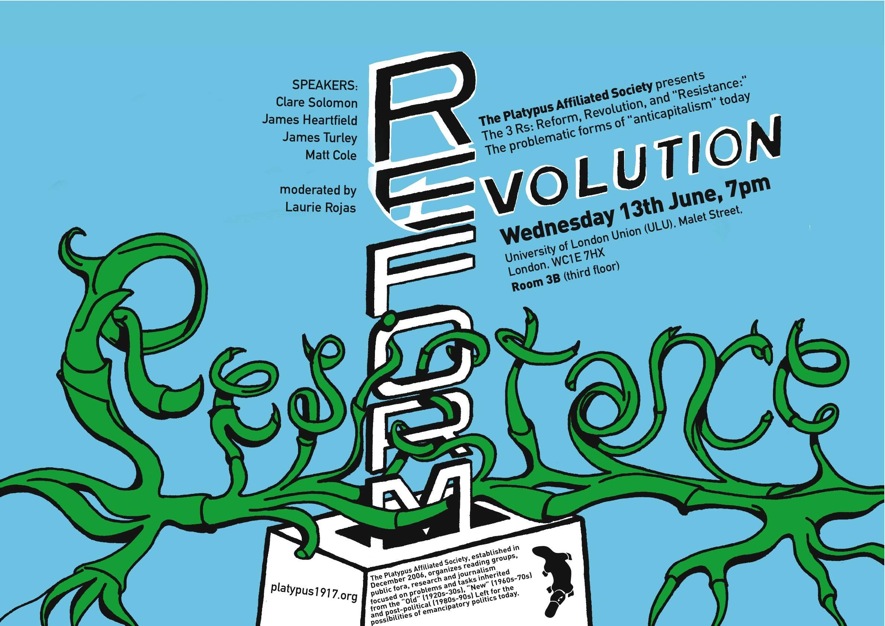 Wednesday 13th June, 7pm
Wednesday 13th June, 7pmUniversity of London Union (ULU), Malet Street, London, WC1E 7HX
Room 3B
SPEAKERS:
Clare Solomon
James Heartfield
James Turley
Matt Cole
Moderated by:
Laurie Rojas
“[After the 1960s, the] underlying despair with regard to the real efficacy of political will, of political agency [. . .] in a historical situation of heightened helplessness [. . .] became a self-constitution as outsider, as other [. . .] focused on the bureaucratic stasis of the [Fordist/late 20th Century] world: it echoed the destruction of that world by the dynamics of capital [with the neo-liberal turn after 1973, and especially after 1989].
The idea of a fundamental transformation became bracketed and, instead, was replaced by the more ambiguous notion of ‘resistance.’ The notion of resistance, however, says little about the nature of that which is being resisted or of the politics of the resistance involved — that is, the character of determinate forms of critique, opposition, rebellion, and ‘revolution.’ The notion of ‘resistance’ frequently expresses a deeply dualistic worldview that tends to reify both the system of domination and the idea of agency.
‘Resistance’ is rarely based on a reflexive analysis of possibilities for fundamental change that are both generated and suppressed by [the] dynamic heteronomous order
[of capital]. ['Resistance'] is an undialectical category that does not grasp its own conditions of possibility; that is, it fails to grasp the dynamic historical context of which it is a part.”
— Moishe Postone, “History and Helplessness: Mass Mobilization and Contemporary Forms of Anticapitalism”
(Public Culture 18:1, 2006)
1. Since the 1960s, and especially since the 1990s, struggles for social, economic and political emancipation have been conceived less in terms of structural reforms or revolutionary transformation and more in terms of “resistance.” How do you define “resistance” and how do you understand its role in possibilities for social change?
2. One powerful way “resistance” has been conceived has been in terms of “culture” and practices of “everyday life.” How do you understand the implicit (if not explicit) distinction thus made of politics directed at society as a
whole, from the more apparently mundane concerns and stakes of quotidian existence?
3. What, in your understanding, are the reasons for and the consequences of this historical shift away from movements for reform or revolutionary politics, to tactics, strategies, and self-understandings in terms of “resistance?”
4. Where do the new forms of politics of “resistance” point, in your estimation, for social-emancipatory possibilities, today and in the future?
5. What kinds of change do you envision on the horizon of present social concerns? How do you imagine the potential manifestations of such change?
6. What can and should those on the Left — those interested in working towards social emancipation — do, tactically and strategically, in view of such possibilities for change?
Also find us at our Facebook event.
Since 2007 Platypus has been organizing a series of events on The 3Rs. Click on the date/location to go to the audio:
//Chicago, November 2007:
Panelists:
Michael Albert (Z Magazine, author of Parecon: Life After Capitalism), Chris Cutrone (Platypus) [Chris Cutrone's opening remarks prepared text], Stephen Duncombe (Gallatin School of New York University, editor of Cultural Resistance Reader), Brian Holmes (Continental Driftand Université Tangente), and Marisa Holmes (new Students for a Democratic Society).
//Boston, April 2012
Panelists:
Jeff Booth (Socialist Alternative)
Gayge (Common Struggle Libertarian Communist Federation)
Joe Ramsey (Kasama Project)
Laura Lee Schmidt (Platypus)
J. Phil Thompson (MIT)
//New York, April 2012
Panelists:
Todd Gitlin (Columbia University)
Tom Trottier (Workers’ International Committee)
Ross Wolfe (Platypus Affiliated Society)
//Toronto (Canada), March 2012
Panelists:
Clare O’Connor,
Baolinh Dang (Proletarian Revolutionary Action Committee- Revolutionary Students Movement),
Cam Hardy (Platypus),
Megan Kinch (#Occupy, Toronto Media Co-Op), and
Jim Stanford (Canadian Auto Workers).
//Halifax (Canada), January 2012
Panelists:
Eric Anatolik (Occupy NS), Jacques Beaudoin (Parti communiste revolutionnaire – Revolutionary Communist Party, Canada) Howard Epstein (New Democratic Party MLA Halifax Chebucto), Max Haiven (Edu-Factory, Historical and Critical Studies NSCAD) and Andony Melathopoulos (Platypus). The panel was moderated by Pam Nogales.

